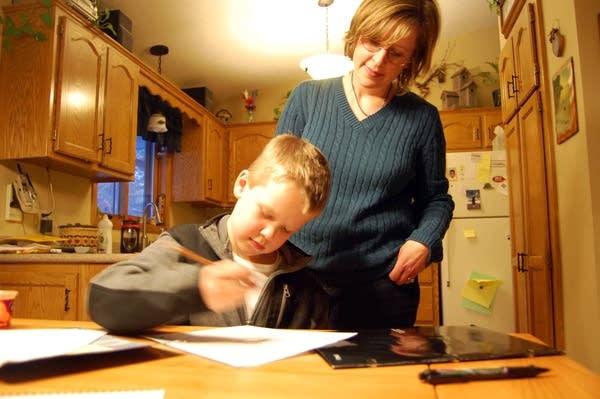Recession shift makes more women breadwinners

The recession has caused a shift in the nation's workforce. More women than ever before are the primary breadwinners for families.
The trend is especially pronounced in Minnesota. Here, more than a third of women with children are now the main source of economic support for their families.
One afternoon last week Gretchen Ackerman arrived at her son Jake's school and realized she didn't need to be there.
She had forgotten her eight-year-old son's after-school class. She came back twenty minutes later. By this time in the day Gretchen Ackerman has already worked eight hours as a technical manual writer.
Create a More Connected Minnesota
MPR News is your trusted resource for the news you need. With your support, MPR News brings accessible, courageous journalism and authentic conversation to everyone - free of paywalls and barriers. Your gift makes a difference.
She's spent an hour-and-a-half commuting between work and home in Andover.
Her evenings are often taken up shuttling Jake between activities.
She's had to do that more often since her husband Scott lost his job as an electrician in 2007 and went back to school. At age 34, Gretchen Ackerman became the sole family breadwinner.
Scott's studying to be a nurse, and tonight he starts volunteering at the hospital.
Gretchen immediately starts in on some chores. Scott makes Jake sit down and do homework. Scott says he's trying to help out more around the house and with Jake.
"I feel bad because she works really hard and she's always kind of taken care of the bills and stuff around the house and now that I'm in school I'll feel guilty because I see her come home I'll see her sit down and do bills," Scott Ackerman says. "And she does a lot of cooking. Boy, it really makes me sound like I don't do anything."
Jake said he tries to help out too.
"Sometimes Dad and I say Mom should take rest and we do it for her," Jake says. "I like helping out when Mom's all tired and she looks like she's about to fall over or something."
Gretchen says it's a sacrifice the family must make for now.
"At some point I realized things aren't going to get better real fast," she says. "It's just this thing that we have to continue working towards. We're not at that goal yet."
So Ackerman took a deep breath and did what it took to keep her family going.
Statistics show that figurative breath was a collective one among a new wave of many American women.
While many women in poor, urban or minority communities have long been breadwinners, the recession made the phenomenon mainstream.
It wiped out many jobs traditionally held by men, like construction. Unemployment among women rose more slowly.
So now the workforce is half female -- the highest proportion in the nation's history. In Minneapolis, half of women with children now earn the majority of their family's income, but women still don't earn as much as men with the same job.
"We have a long way to go to economic equality if you dig below the surface," said Debra Fitzpatrick, director of the University of Minnesota's Center on Women and Public Policy.
She says the glass ceiling is still firmly in place.
"While women have poured into the workforce their proportion of top leadership in almost any sector you can name is still well below their representation in that workforce," she said.
Fitzpatrick says women aren't getting much relief at home either. She said research shows many breadwinning women come home and take care of the kids and cook.
As a consultant, Beth Quist of the non-profit Working Family Resource Center in St. Paul saw the female breadwinner phonemenon sweep local workplaces.
A year ago she became part of the phenomenon. She's now the sole breadwinner for her family, and many of her friends are too.
"We talk alot about constantly renegotiating roles or responsibilities, but also how women have more responsiblitlies than in the past," Quist said.
Gretchen Ackerman learned to cope by turning to the church for the first time, where she finally sits down this evening at Andover Christian Church Church, down the street from her house.
Ackerman chips in like everyone else to pay for the church dinner of macaroni, meatloaf and mixed vegetables. The meal out gives Ackerman a night off from cooking. While Jake plays with friends she's free to sit and chat.
"I have my bad days and then I do get resentful," she says. "But really when I evaluate it I think does it matter. What's important is this family."
Ackerman hopes one day things will change so she can spend more time with Jake and less time rushing around. She says going part time has always sounded nice.
